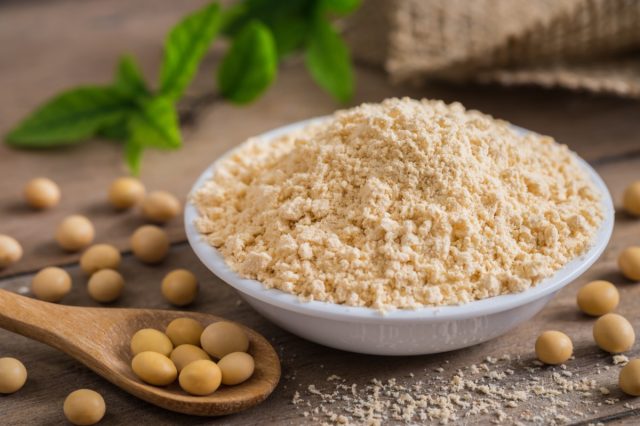If you want to lower your cholesterol levels, soybeans might be just what you need. While past research has shown that adding soy to your diet—or increasing the amount of soy that you already eat—can decrease cholesterol, a new study has found that it might be just as effective as commonly used medication to help manage overall cholesterol levels known as statins.
During the study, which was published by Antioxidants, scientists took a look at 19 different types of soybeans with varying levels of glycinin and B-conglycinin. Each soybean was also ground and defatted. After running each individual soybean flour through a simulation that was intended to mimic digestion and used fatty cells, it was found that two proteins in soybeans—glycinin, and B-conglycinin—helped to lower cholesterol. Researchers then measured the extent of absorption of LDL (or "bad") cholesterol in each case.
"We measured several parameters associated with cholesterol and lipid metabolism and various other markers— proteins and enzymes—that positively or negatively affect lipid metabolism," study author Dr. Elvira de Meji, professor of food science at the University of Illinois Urbana-Champaign, reportedly explained via Medical News Today.

Beyond that, those behind the study also assessed the effectiveness of both soybeans and cholesterol statin medication, Simvastatin, which is also known by the brand name Zocor, according to the Mayo Clinic.
"The digested soybeans' peptides were able to reduce lipid accumulation by 50% to 70%, and that's very important," Dr. de Meji told Medical News Today. "That was comparable to the statin, which reduced it by 60%."
According to the study's researchers, the overall results suggests "that the intake of selected soybean varieties might regulate cholesterol and LDL homeostasis and, consequently, foster the prevention of atherosclerotic cardiovascular diseases."
"Since this was an in vitro study, we can't be sure whether the same effects on LDL cholesterol would be seen in humans," Stephanie Wells, MS, RD, tells Eat This, Not That! while addressing the new findings.
"The researchers tested 19 different types of soybeans with varying glycinin:β-conglycinin ratios," Wells also points out. "But it would likely be difficult for consumers to find out what specific variety of soybean their tofu is made with, so this information probably won't be very helpful to most people."
"Since the soybeans were defatted, we can't be sure whether the same effects on LDL cholesterol would be seen with consumption of whole soy foods, like edamame, tempeh, and soy curls, or minimally processed soy foods like tofu and soy milk—which have not had the fat removed," explains Wells.
"A 2015 study found that the LDL-lowering effects of soy were stronger with whole soy foods rather than soy products which were more heavily processed," she adds. "On the other hand, many people have concerns regarding the healthfulness of processed soy foods like textured vegetable protein. And if the results of this study are found to translate to humans, it could help assuage these concerns," Wells says.
"Soybeans are a nutritious legume rich in protein, fiber, isoflavones, and heart-healthy monounsaturated and polyunsaturated fats," says Wells. "They are low in saturated fat and cholesterol," which is why "including soybeans as part of an overall heart-healthy eating pattern can be a great choice for people looking to lower their cholesterol."
No comments:
Post a Comment